Spirited
Away (Sen to Chihiro no kamikakushi)
2001
Director: Hayao Miyazaki
Starring
(in English language version):
Daveigh Chase, Suzanne Pleshette, Jason Marsden
I
don’t really care for “children’s movies.”
I think I overdosed on them too much when I was growing up; I remember
coming home from college and my parents taking the family out to see the latest
Pixar movie in theaters when I would much rather have seen, well, anything
else. Too many viewings of Monsters
Inc (no offense, Pixar) have kept me from seeking out other animated or
children’s fare, so most of the recent children’s films in 1001 Movies I
have yet to see. Spirited Away is a very
nice, lovely children’s movie, but it hasn’t exactly changed my mind.
Ten
year old Chihiro (Chase) is being carted off to live in the suburbs against her
will by her parents. On their way to the
new house, her family stops at what appears to be an abandoned theme park. Her parents are excited, but Chihiro is
wary. After eating some mysterious food,
her parents turn into pigs and Chihiro realizes something is dreadfully
wrong. She has entered into the spirit
world, and the place is actually a bath house for wealthy spirits run by the
menacing Yubaba (Pleshette). With the
help of Haku (Marsden), a young man who is also a trapped dragon spirit,
Chihiro must navigate this new world and learn to play by its rules in order to
free her parents and get back to where she belongs.
The
story of Spirited Away is reminiscent of a fairy tale, and I highly
doubt I’m the first to make such an association. The concept of an ordinary human being
journeying through an alternate realm full of magic brings Alice in
Wonderland to mind first and foremost, but other standard tales just as
well. I was reminded of Andersen’s “The
Snow Queen” in terms of the idea of a human character forced to go through the
trials and tribulations of a magic world she doesn’t understand in order to
save her family. Yubaba’s name obviously
conjures up images of Baba Yaga from Eastern European folklore, and although
the name might be a mere coincidence, the character herself only strengthens
such an association. Yubaba’s face is
always precisely what I pictured Baba Yaga to look like (although my Baba Yaga
never wore a blue Victorian gown).
Yubaba transforms into a bird, and Baba Yaga lived in a hut on top of a
chicken’s leg, and Baba Yaga herself is an ambiguous character. Although Yubaba is certainly the closest Spirited
Away has to a villain, she is not wholly evil, and her twin sister
Zeniba is downright kind and maternal, another possible reading of Baba
Yaga. Finding these European fairy tale
tropes together in a Japanese film is surprising, certainly, but for me, it
helped to cement the world of magic and mysticism. What’s more, I appreciate that there is
always a sense of danger in the magic of Spirited Away, just like there is in
so many of the original European folk stories.
This is not Disney’s prettified world, there is still damp and ugly and
danger. This, to me, is what fairy tales
are all about.
But
where Spirited Away diverges most significantly from its fairy tale
aura is in its presentation of good and evil.
The only other Miyazaki film I’ve seen prior to this is Princess
Mononoke, and both these films treat good and evil similarly. Miyazaki is a surprisingly even-minded
storyteller when it comes to this, as I have yet to see a character in these
two films that is completely bad.
Rather, there exists a spectrum, and the characters are fluid in their
placement along it. For example, Yubaba,
as mentioned above, is the closest thing Spirited Away has to a villain, and
yet at one point, she ecstatically hugs Chihiro. Motivated less by power and more superficial
greed, she bends and compromises when she has to, a trait incredibly uncommon
to typical villains. By the end of the
story, she feels not so much evil as merely shallow. Then consider Haku, Chihiro’s friend and
guide. Although I implicitly trusted him
when he first shepherds Chihiro through the world, we are almost immediately
met with disparate opinions about Haku. We
are told he is a thief, a henchman, and untrustworthy. I began to doubt whether I could trust him
after all. No-Face, Lin, Kamaji, and the
giant baby are all other characters that are difficult to read. Whose side are they on? Are they helpful or harmful? And the thing is, they’re all a bit of
both. Maybe there isn’t such a thing as ‘all
right’ or ‘all wrong,’ and to see this ambiguity presented in a children’s
animated fairy tale is impressive. In
fact, the only character who can be considered truly “good” in the typical
sense is Chihiro, and we must remember she’s rather sulky at the beginning. I appreciate this take on morality, and as I
said, it coincides completely with what I remember of Princess Mononoke. The characters in Miyazaki’s films feel
richer because of this refusal to simply “pick sides.”
Here
is where I should probably mention the animation. Of course it’s amazing, it’s Studio
Ghibli. My favorite component of the
animation is the background design. It’s
breathtaking as the world of the spirits is slowly built; as Chihiro and her
family explore the abandoned theme park, we see more and more buildings, and
then the great bath house appears. This
world, the rooms, the sets, so to speak, are gloriously detailed and full of
rich, vibrant color. Yes, the characters
are all incredibly imaginative – No-Face was probably my favorite design – but
I really love the backgrounds. Beautiful.
Spirited
Away is a
lovely, magical tale that clearly coincides with a coming of age story for its
central character. Chihiro must find her
strength and adaptability in order to survive this strange new world with its
ever-shifting characters. It’s really
quite nice, but I’m not a huge fan of children’s movies in that I would rarely,
if ever, choose to watch a film that self-identifies in this way. Although I don’t think I’d ever watch this
again, I enjoyed my time with Spirited Away.
Arbitrary
Rating: 7/10
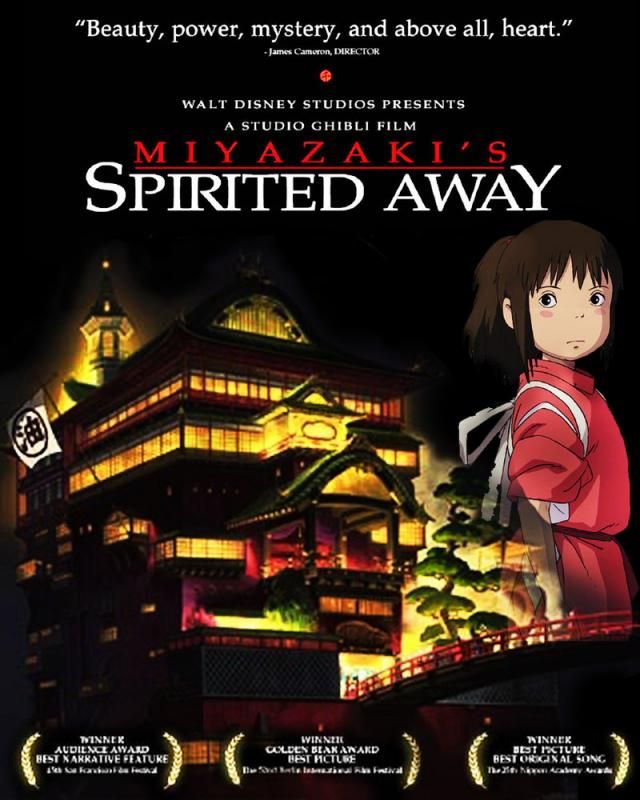
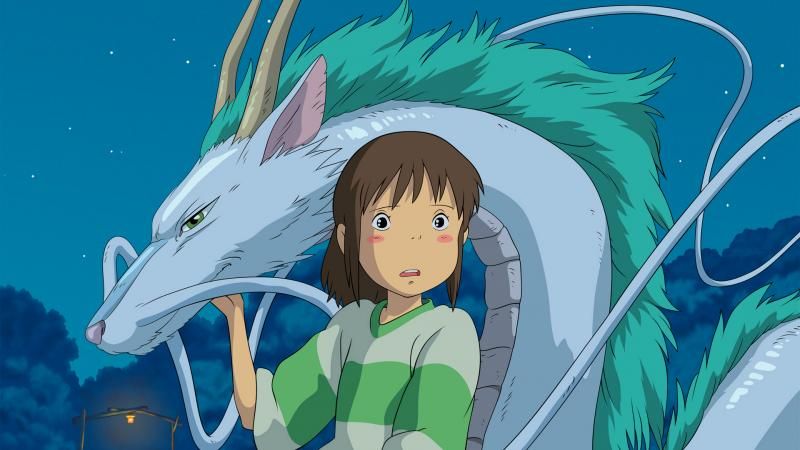
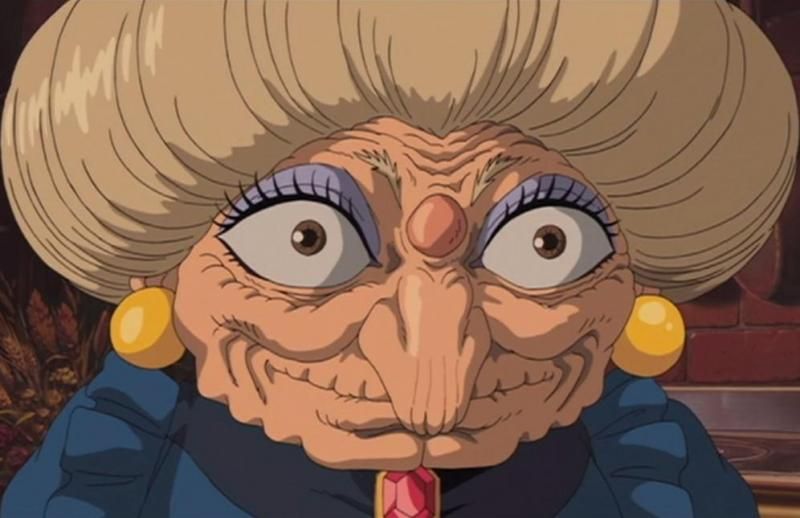
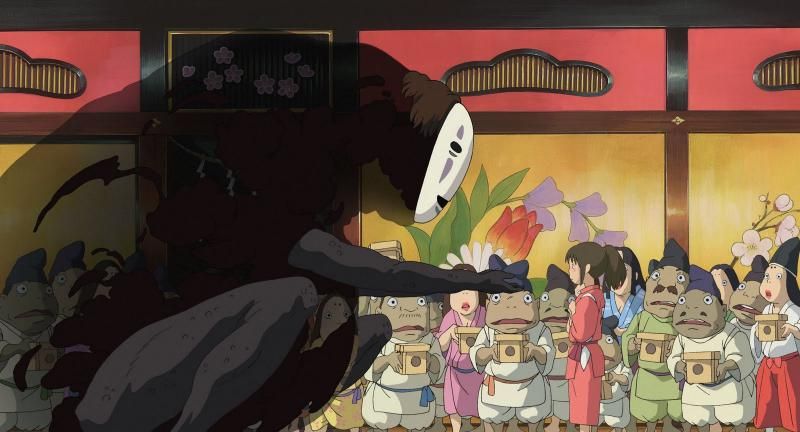
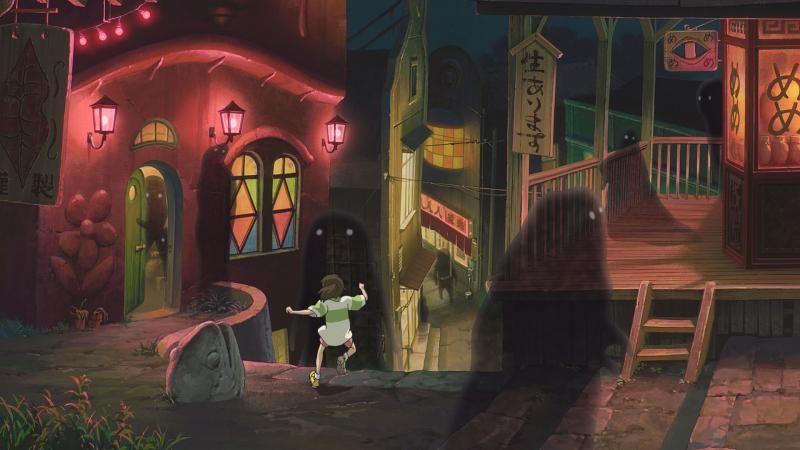
I think part of the problem is that most people make the assumption that all animated films are "children's movies". Sure, that is the case most of the time, but I could name plenty of animated films that are just that: animated FILMS (Akira, Grave of the Fireflies, and Paprika come to mind instantly, as does Ghost in the Shell). Just because a film is animated doesn't mean it has to pander to the adolescent crowd (something that, admittedly, American animation studios outside of Pixar have yet to fully grasp); if one goes into an animated film with the mindset that it has plenty to offer the adult crowd (which, again, the American animated fare largely does not), I think people stand a much better chance of appreciating just what a great job Pixar and Miyazaki, among others, do as filmmakers and storytellers first.
ReplyDeleteIf you need some recommendations as to animated films that might break that mindset of "Oh, it's animated, so it must be a children's movie", let me know and I'll see what I can dig up. I'll admit, they are somewhat rare, but they are out there, mostly in foreign markets.
Yeah, empirically I know that animated does not equal children's film. But to be fair, in 99% of the cases, that is true. And Spirited Away IS a children's film; a fun little fairy tale with just enough danger to make it interesting.
DeleteI mean, I don't think Spirited Away is bad, not at all, it's just not quite to my taste. The animation is gorgeous and the story is nicely balanced with enough complexity to make it interesting. I just wouldn't choose to watch it again.
I have purposely not yet watched Grave of the Fireflies. Because I am waiting for the time when I feel I am emotionally capable of handling it. (which may never come.)
Jesus, I know I need to watch that movie, I'm just getting frightened of how badly it might traumatize me.
I'm completely with Adolytsi on this. Spirited Away is most definitely NOT a childrens' movie. I knew from your first paragraph that I would be writing this in my comment; Adolytsi just beat me to it. And no, 99% of animated films are not for children, not even in the U.S. In Japan almost all animated films released in theaters are intended for adult consumption, including all of Miyazaki's films. The closest he has come to something for children is My Neighbor Totoro, which is beloved by millions of adults.
ReplyDeleteFrom everything you wrote you seemed to enjoy and appreciate the film. The only problem you seem to have with it is the designation "children's film", which was self-assigned.
I have seen several reviews here where you have noted that upon a second watch you appreciated a film much more because you knew what you were going to be getting. I recommend that at some future point you give Spirited Away a second watch and go in now knowing that it is not a childrens' film and see what your impressions of it are then.
Hmm, we shall have to agree to disagree, because I very much think that Spirited Away IS a children's movie, and not just "because it's animated." Because of its content. It's not children's movie fare in the way that American children's movies typically are - in fact, it's pretty damn far away from any sort of American children's movie - but when I think of the books I read growing up, the stories that I was enraptured with, they reek of the same material that is Spirited Away. Alice in Wonderland, Half Magic, The Dark is Rising, any and all European-based fairy tales, they all share the same sort of central spirit as Spirited Away. And to me, given that's what my literary experience of childhood was about, will forever make Spirited Away a children's movie to me.
DeleteDoes this mean it should not be taken seriously? No, of course not, and I take those above pieces of fiction very seriously. But they are, primarily, works intended to inspire and pique the interests of children. Yes, adults like them and SHOULD like them, but Charles Dodgson devised his tales first and foremost as means of entertaining his young niece.
And as I opened with, I was overdosed on children's movies as a young adult.
I am more than willing to give Spirited Away another shot. I can't say how I'll react to it, as I never know how I'll react, but I will add that if you really want me to like it more than I did, I have to wait a minimum of two years to see it again. I need some time in between viewings to allow myself to "forget" enough impressions of a film so I can come back to it with a truly open mind, if that makes sense.
If you are still going to have the opinion that this is a children's movie then there's no point in watching it again. For me, its greatness stems from the very fact that it is not a children's movie.
DeleteYes, the works of literature that you mentioned (that I've heard of - maybe I'm showing my age) are geared towards children. Just because something appears to mirror some fairy tale stories doesn't always mean it's for kids, though. The Lord of the Rings is a prime example. The Silence of the Lambs is another.
In regards to children's movies, here is the basic plot:
1. Meet good guys
2. Meet bad guys
3. Bad guys do something evil because they're bad
4. Good guys triumph because they're good
This is what people expect when they hear a film is a children's movie - something generic and simplistic.
Now compare that to Spirited Away with its complex characters and its storylines regarding ecological themes, moral ambiguity, and love and loss, and this is why most people consider this to be aimed at adults first.
You may be wondering, "Why does it matter?" It matters (to me anyway) because I see certain labels applied to films for the purpose of disregarding them. "It's only sci-fi" is another example. Unfortunately, when many people see those labels they simply avoid great movies such as Contact, The Man from Earth, Children of Men, Grave of the Fireflies, The Iron Giant, and many many others. I include Spirited Away among those great movies. I've seen far too many people say that they won't watch it because it's just for kids. I've convinced (browbeaten?) some friends and co-workers into watching Spirited Away over the years - all resistant to it because they felt it was for kids - and the universal response I've received was "Wow, I had no idea. Why can't other animated movies be like this?" The ones I convinced to watch it were a minority, though. Most just held on to the "I'm not watching a kid's film" position. I also worked with a woman who refused to watch any movie that was in black and white, for no other reason than they were not in color. I couldn't even get her to watch Casablanca.
I'm not immune to it myself. Tell me a film is a "horror movie" and I will be far less interested in seeing it than if you tell me it is a "suspense movie" or a "thriller".
Your follow-up question could be, "Why does it matter if these people didn't see it?" This could be a very good point. Why do I care if someone sees a good movie or not? I've asked myself that question a few times over the years. Maybe it's related to the same (sometimes misguided) attempt some people have in trying to fix up their friends with each other. "If I like John and I like Joan then John and Joan will like each other, if only John can get by the fact that Joan likes country music." Maybe I have the same rose colored glasses and I feel that if I and other people I like enjoy a movie then so will someone else I like that has not yet seen it, if only they can get by whatever label is preventing them from watching it.
Anyway, I'm getting into too much navel gazing here. You still appreciated the movie even though it wasn't your cup of tea and that should be that.
I am in no way trying to make you change your mind about Spirited Away, but I thought you might like to read these:
ReplyDelete"The symbol is used on the entrance to 温泉 (onsen) and 銭湯 (sento), or Japanese bath houses. The word “yu” is translated to “hot water”. So, makes sense to be on a bath house, yes?
Then I did more reading. During the Edo period, these public baths became popular for men because of women who started working at these communal baths, washing men and selling sex. These bath houses were called “yuna baro”. The woman were known as 湯女, or “yuna”. This directly translates to “hot water woman”. So basically, they were brothels. Guess what the woman who ran this bath house would be called?
ゆばば。
Yubaba.
(translates directly to “hot water old woman”)
Yubaba is the name of the woman who runs the bath house in Spirited Away. If you watch Spirited Away in Japanese, the female workers are referred to as yuna.
Chihiro was forced to change her name to Sen. Kinda like how strippers get names like “Candy”.
カオナシ/No-Face keeps offering Chihiro money. He “wants her”.
THEN I read interviews with Miyazaki. This was all put in intentionally. As we all know. Miyazaki’s stories are weaved with different themes and metaphors. He said he was tackling the issue of the sex industry rapidly growing in Japan, and that children being exposed to it at such early ages is a problem." (http://ghibli.livejournal.com/322459.html)
"I thought that the idea for No Face was that he is some sort of monster who has no identity of his own (hence the name), and so he is defined by holding up a mirror to his surroundings.
In the bath house, where greedy and petty people surround him constantly, No Face becomes greedy, eating everything that he can, and also feeds the selfish tendencies of those around him by creating gold.
Around Chihiro and Zeniba, both kind people, No Face becomes helpful, providing bath tokens or helping to spin thread.
Ultimately, Spirited Away is all about children and their development, and No Face pretty much represents the impressionability of children. His reactions to things around him and his mimicry of others' mannerisms both suggest this metaphor. His power as a spirit means that he brings a sort of "instant karma" to the issue of how we treat suggestible people.
He does nicely mirror the concept of a null mask. A null mask (in theatre parlance) is a mask that does not portray a specific emotion. It is a compelling image but is not emotional until invested with emotion by the context of the play, the body language of the actor and audience expectations. The mask then seems to have an emotional life of its own.
Noh theate in Japan does indeed make use of null masks and I thought it was sort of a bilingual pun on the part of the movie. Don't know if it is in the original, though.
As you can see, the No Face character in the film acts as sort of a reflective null mask, responding to its audience.
A good example of a null mask we are all probably familiar with is Darth Vader; he can be menacing, doubtful or sad and somehow the mask seems to convey it all without any sort of physical change." (http://forum.rpg.net/archive/index.php/t-289050.html)
I think the reason I love this film so much is because I can interpret it. It's not one of those children's animated movies where you sit there and watch colors dance across the screen for 90 minutes. It gives me something to think about, which I find admirable in a children's movie.
Yes, I think it is a children's movie. However, that doesn't mean it must be enjoyed by only children, and it doesn't mean that it follows the same children's movie "recipe" as most do. It simply means the creators intended for children to watch it.
Thanks for the info, that's very interesting! I love knowing stuff like this, thanks for sharing!
Delete